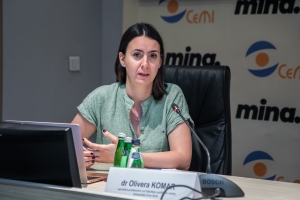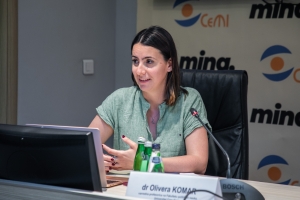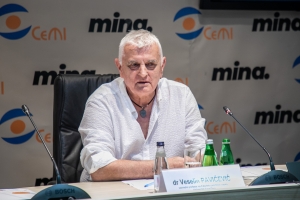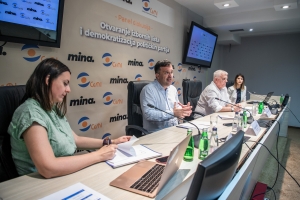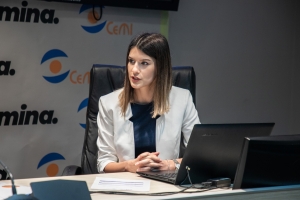Podgorica, (MINA, CeMI) - The system of open electoral lists in Montenegro can function only if the entire country is divided into several constituencies, according to associate professors at the Faculty of Political Sciences (FPN), Olivera Komar and Veselin Pavicevic.
Komar and Pavicevic said that at the panel discussion "Open lists and democratization of political parties", organized by the Centre for Monitoring and Research and the MINA Agency.
Docent at the FPN of the University of Montenegro, Zlatko Vujovic, said that he was primarily interested in the process of selecting candidates from the party, as well as the influence of voters on who will be the representative in the Parliament.
"At some point in the development of democracy, we must begin to democratize political parties," Vujovic pointed out.
He said that in Montenegro, citizens do not have the opportunity to choose within the list or to combine candidates from several lists.
Comparatively, according to Vujovic, the closest example to Montenegro is Kosovo, where preferential voting is currently represented.
" Kosovo where, despite the dominant position of the parties, until the last elections, you did not have a case where one party won more than half of the majority. Preferential voting contributed to that," believes Vujovic.
He said that the constituencies in that country are large, but that the ballot has just one side.
"One third of the ballots are dedicated to the names of political parties, while the other two thirds are divided into fields similar to the lottery ticket, which contains the number of candidates," explained Vujovic.
He said that the opening of the list leads to a high degree of personalization of the campaign, i.e. that the candidates try to be remembered by the voters as well as as the parties.
One of the good things, as he said, is that the support of voters does not depend on the position of the candidate on the ballot.
"It is not a problem that they do not work in the campaign, but they do not work during their mandate either. There are stray MPs in Montenegro, to whom the system enables that," said Vujovic.
He said that he sees the solution in a mixed proportional system, adding that it is difficult to explain that system to citizens and political actors.
"Preferential voting has become the standard in Europe," pointed out Vujovic.
He said that the fears related to clientelism and buying votes, in case of opening the electoral lists, are justified.
"But we have buying votes in this system as well, don't we? You have a situation where vote buying votes is almost legitimized. We have clientelism that is widespread, weak competition in parliament, populism ", said Vujovic.
Komar said that the issue of responsibility is very important and it is emphasized in the narrative of open lists, but it is not related to the deputies.
„This is a general lack of responsibility. I would say that there is an even bigger problem of the executive than the legislative power ", said Komar.
She advocates for conservatism, which, when it comes to changing the electoral system, leads to security.
"The countries that have the worst possible electoral system, namely the United Kingdom and the United States of America (USA), are not changing it because changes are something that needs to be weighed very well," said Komar.
She said that she doubted that the introduction of an open list system would lead to an increase in the responsibility and activity of MPs.
"We did a research after the previous parliamentary elections, after the story about open lists began. We asked the respondents for whom they would vote from the list and we came to the result that 76% of the Assembly would look the same ", said Komar.
As she added, 60 percent of the respondents in that research chose the holder of the list, which does not speak in favor of the argument about the intervention of voters on the electoral list.
As she added, democratization of parties is a good thing, but it would be more adequate to organize elections within parties.
She said that the introduction of open lists will not lead to the personalization of politics at the state level, unless the state is divided into constituencies.
"Let's improve the development of political culture, not to overregulate things. Political culture is advancing in Montenegro, we are essentially witnessing change," Komar said.
She stated that open lists open space for clientelism and buying votes, as well as for populism, adding that, if women's quotas are maintained, the difference in the number of votes received by men and women will be more visible.
"Essentially, it seems to me that we are very easily giving up the rules we have, we are going to pre-regulation, instead of making an effort to get things started," concluded Komar.
Veselin Pavićevic, associate professor at the FNP of the University of Montenegro, said that Montenegro has great experience today, but that political practice does not go into the depths of things.
He said that, in his opinion, great importance is attached to the segment of electoral systems, adding that there are over ten thousand electoral systems.
According to Pavićević, the intention of the open electoral list system is to reduce the power of the party leader, stating that the question must be asked whether the party can do without a leader.
"As free citizens, we accept the programs and statutes of the parties," said Pavicevic.
He said that in favor of the system of open electoral lists, one can hear the argument that the government that arises from the free will of citizens, as well as direct contact between citizens and voters, is legitimate.
"But there is no talk of the number of constituencies," added Pavicevic.
According to Pavicevic, it is also rumored that open lists will influence the recomposition of the electoral list with the votes of citizens.
As he added, the question arises as to who is forming the electoral list.
"The party's main board is doing that. They do so with the consent of their authorities. The party is distributing candidates within itself ", pointed out Pavicevic.
He said that the women's quotas are not taken into account in that system, emphasizing that the presence of women would be directly questioned.
"If the order on the electoral list is decided in the parties, everyone will say that there are no pretense. For several years now, splitting of votes has been rare in Germany. Usually, the preferences of the party and the candidates on the electoral lists coincide," Pavicevic said.
He also stated that it is questionable what the voting material would look like, that is, what the ballot paper with a large number of candidates would look like.
"I would like to open the issue of a differentiated election census. It is not the same if one party performs alone. Also, the question is whether we will ban election coalitions or not," said Pavicevic.
He said that each list will put the strongest players in the foreground.
"Nowhere have I seen that the reform is based on such ineffective changes, and what is required will not be obtained. Let's divide Montenegro into several constituencies, this can work there," Pavicevic said.
Social Democrat (SD) MP Boris Mugosa said that there was a lot of talk about open lists, but from a superficial aspect.
"When we decide whether to go for reforms, we need to listen to the experts more," Mugosa said.
He stated that a new Law on the Election of Councilors and Members of Parliament must be introduced in Montenegro.
"Personally, I am more in favor of open list because it must be influenced that the public identifies more with individuals. Not to create character and work, but in that way to help citizens to get educated. It seems to me that it would be easier for us MPs to have that kind of more direct support from the citizens ", said Mugosa.
He said that all models must be adjusted in Montenegro.
"We often experiment, or they experiment on us, and that's where the problems arise," Mugosa said.
The panel discussion was organized as part of a project implemented by MINA in partnership with the Centre for Monitoring and Research, which was financially supported by the Embassy of the United States of America in Montenegro.

